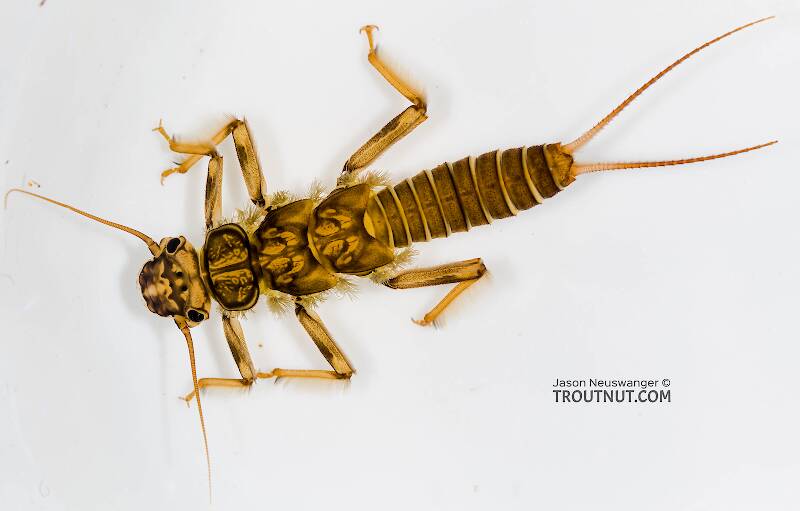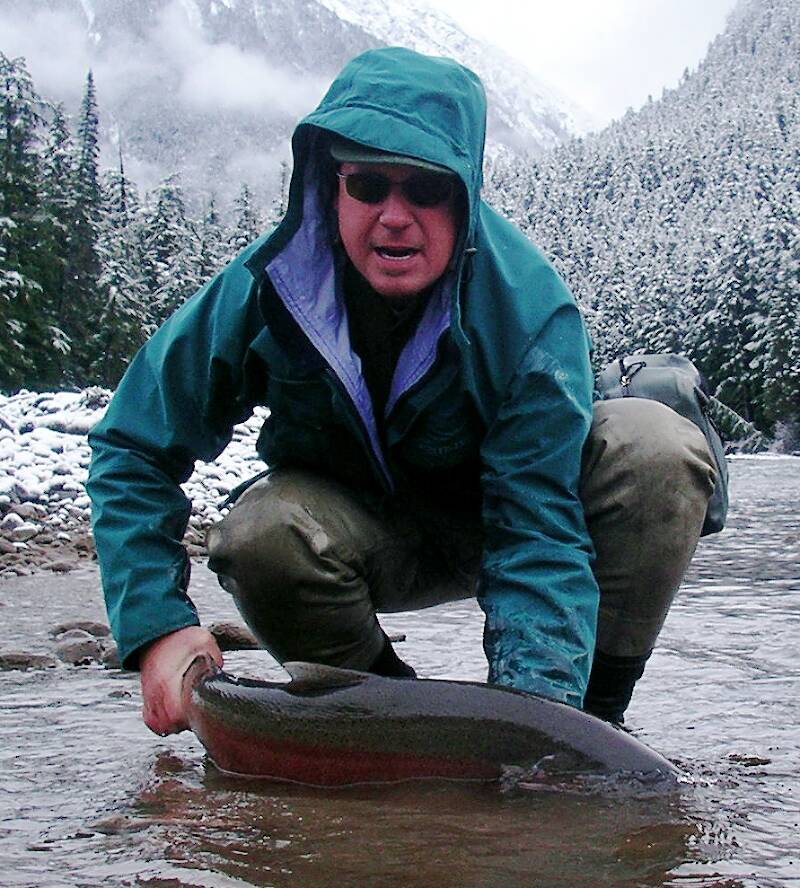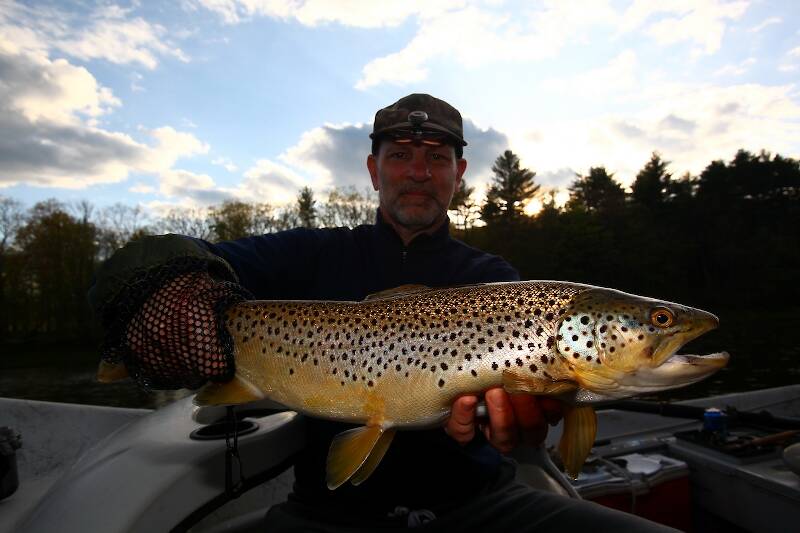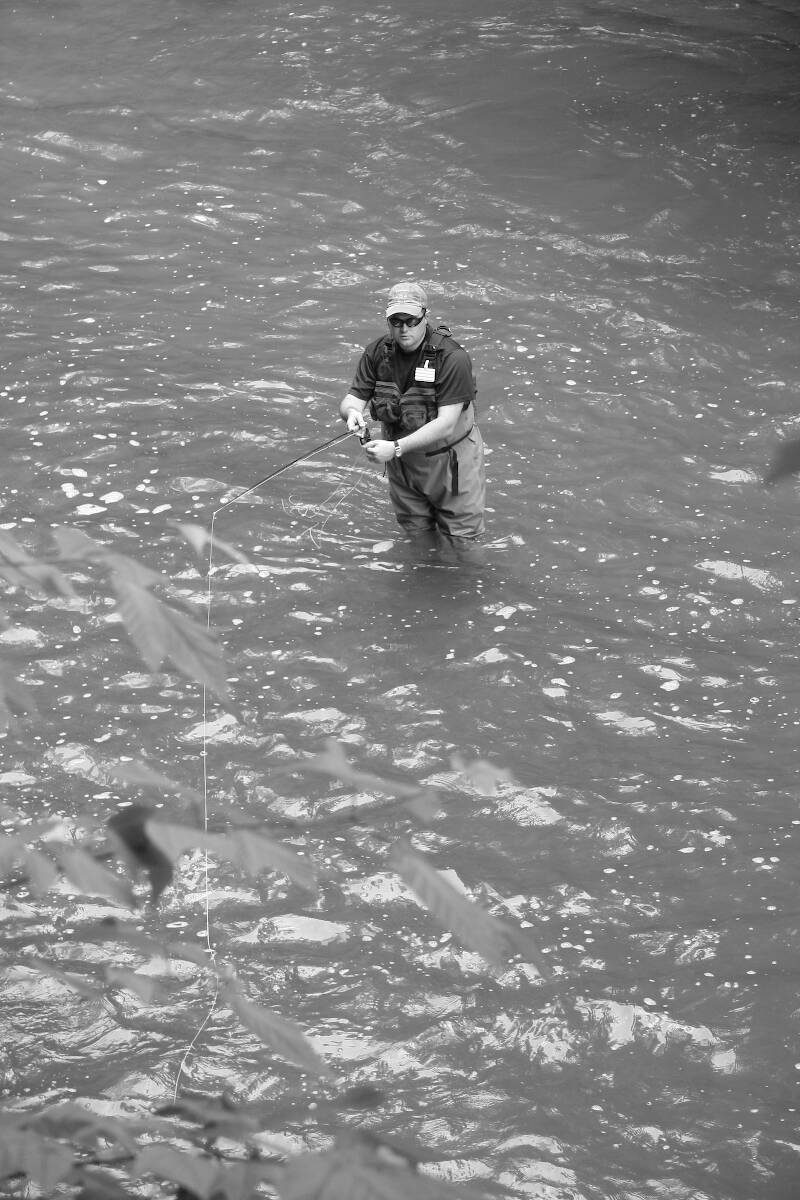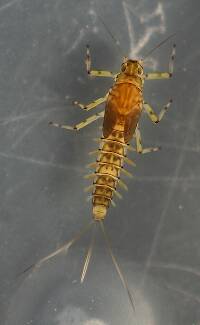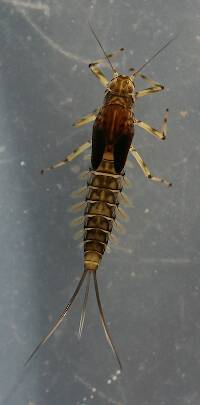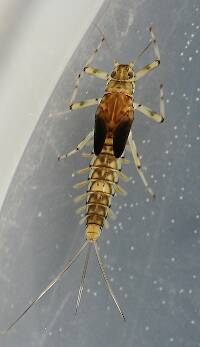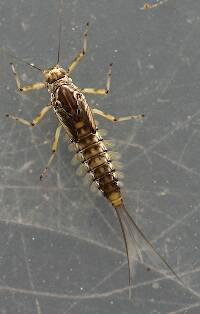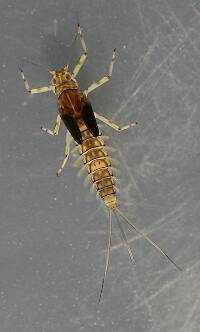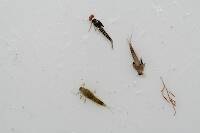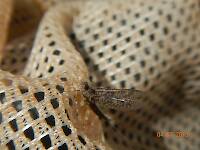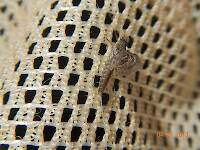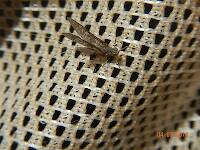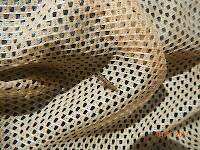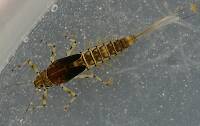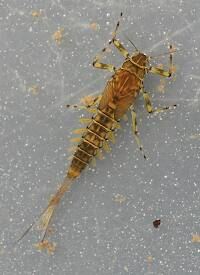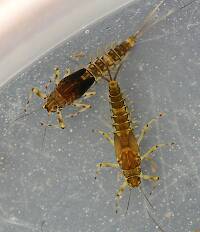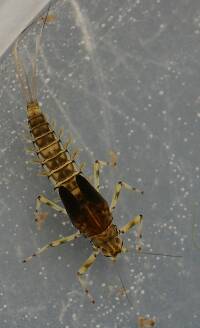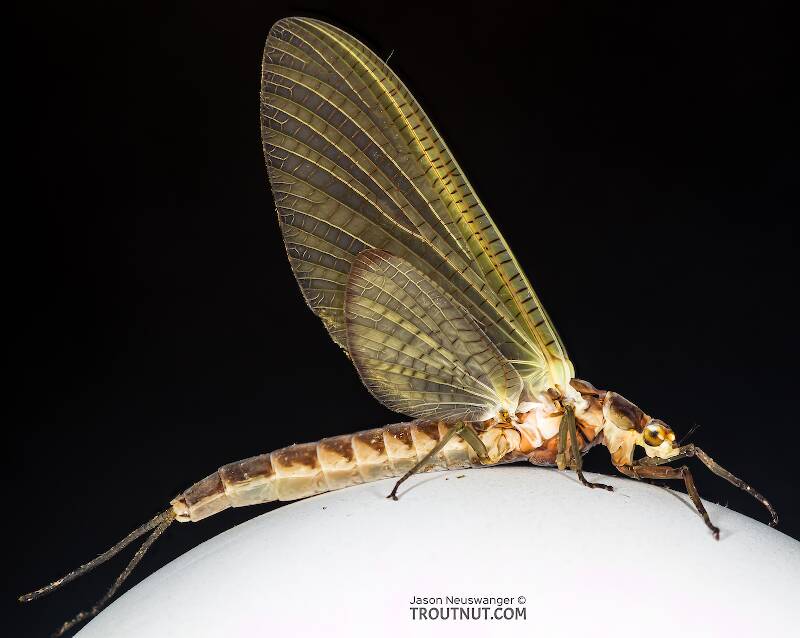
Hex Mayflies
Hexagenia limbata
The famous nocturnal Hex hatch of the Midwest (and a few other lucky locations) stirs to the surface mythically large brown trout that only touch streamers for the rest of the year.
Featured on the forum

Troutnut is a project started in 2003 by salmonid ecologist Jason "Troutnut" Neuswanger to help anglers and
fly tyers unabashedly embrace the entomological side of the sport. Learn more about Troutnut or
support the project for an enhanced experience here.
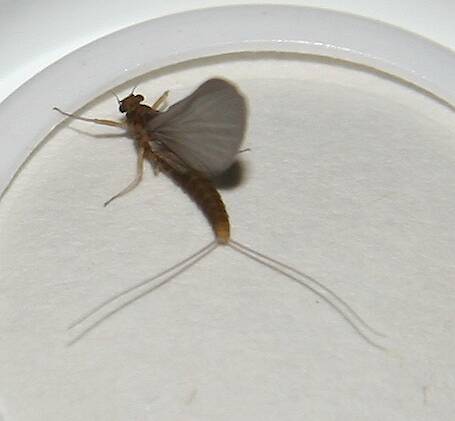
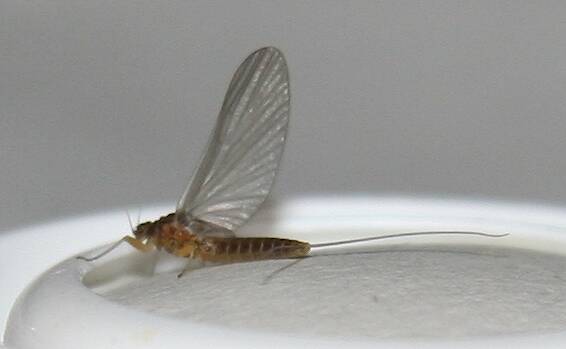
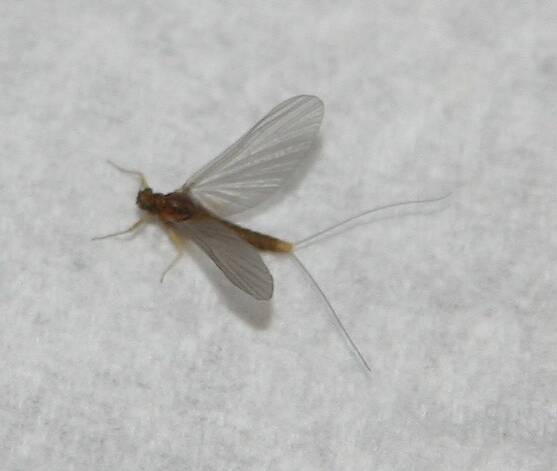
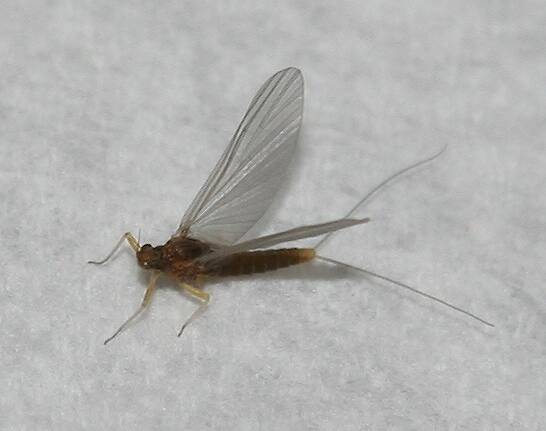
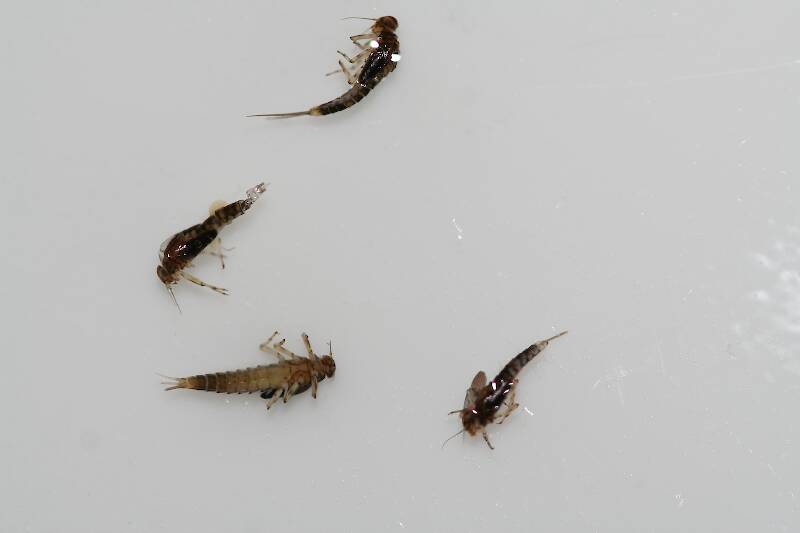
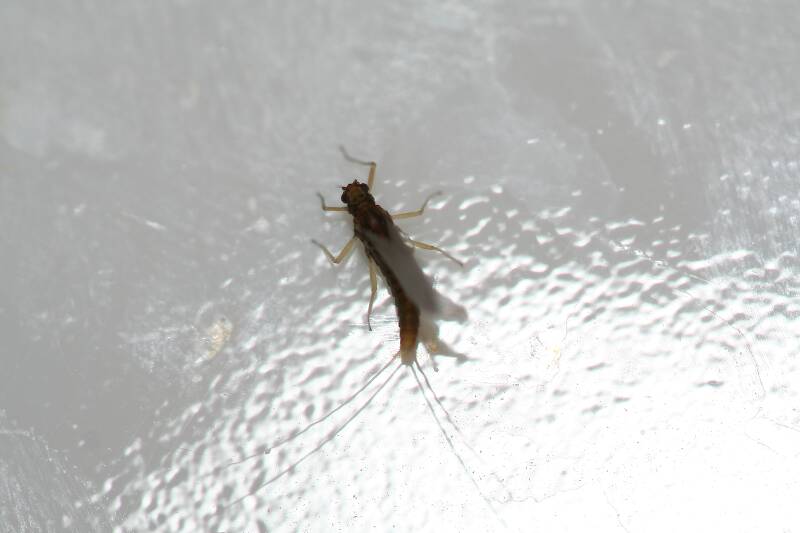
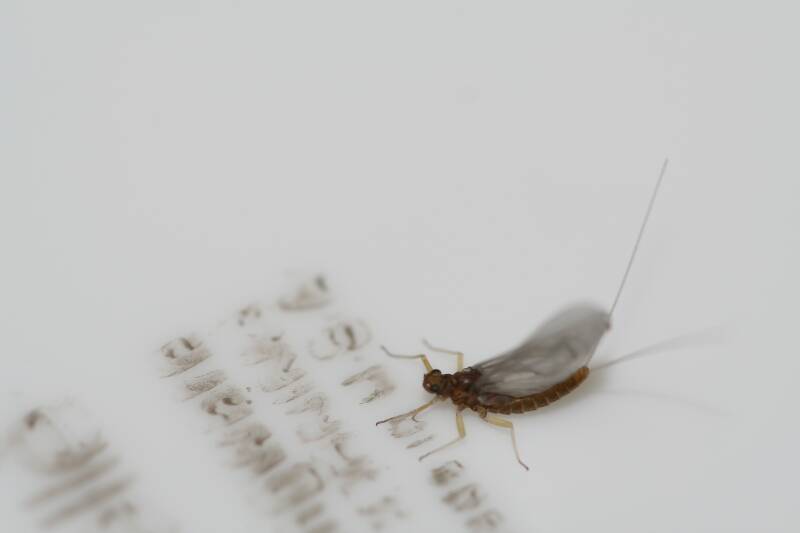
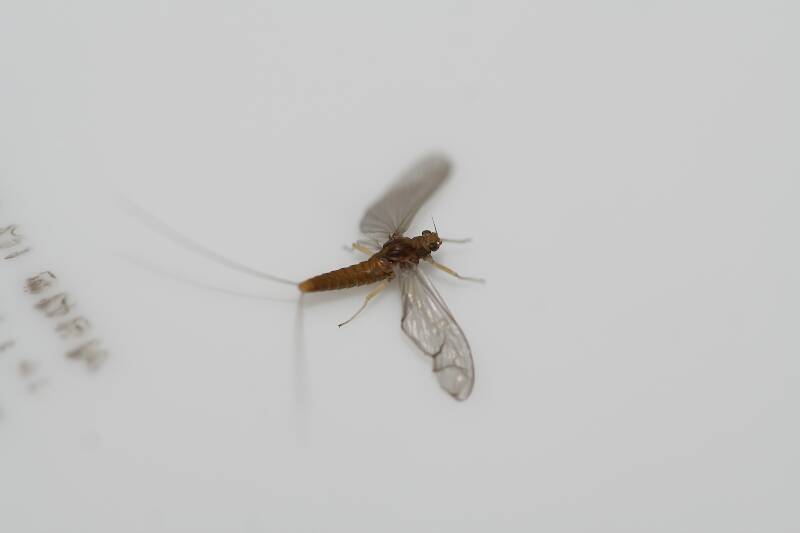
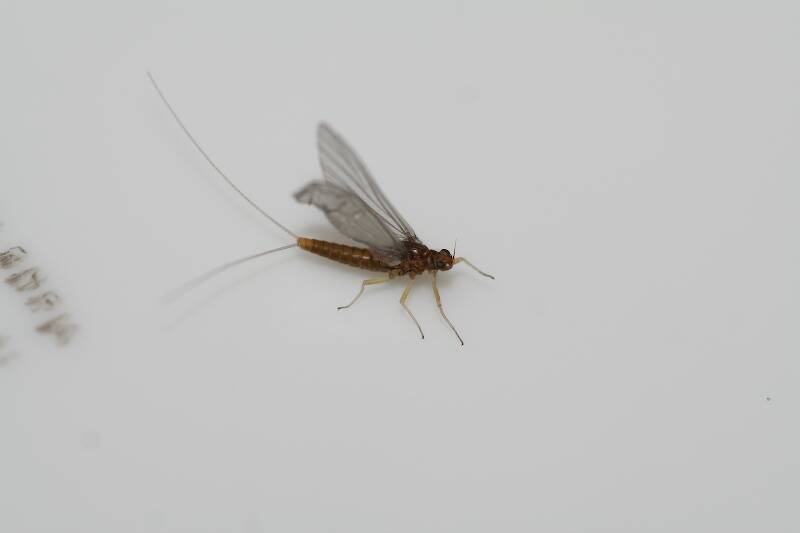
Shawnny3 on Jun 29, 2012June 29th, 2012, 8:36 pm EDT
Here's a little guy I caught today on the stream. I also seined several nymphs that hatched on my finger. One thing I find interesting is how much difficulty they often have shedding their shucks. Often they get stuck when I'm watching them emerge. I wonder if part of that is that, on my relatively dry hand, they don't have the water's surface tension to pull and push against as they're struggling. My initial thought would have been that they'd have an easier time hatching on my finger, but perhaps it's the opposite - removing them from the water's surface is an impediment?
Can anyone go to genus or species level with these pics? They're the best I can do. The dun is about Size 22. It was quite photogenic, posing proudly even after several hours in a vial and wiggling its rear end provocatively. Is it wrong that I find BWOs very attractive?
Thanks,
Shawn
Can anyone go to genus or species level with these pics? They're the best I can do. The dun is about Size 22. It was quite photogenic, posing proudly even after several hours in a vial and wiggling its rear end provocatively. Is it wrong that I find BWOs very attractive?
Thanks,
Shawn
Jewelry-Quality Artistic Salmon Flies, by Shawn Davis
www.davisflydesigns.com
www.davisflydesigns.com
Entoman on Jun 29, 2012June 29th, 2012, 9:49 pm EDT
I'm sorry Shawn, but I can't even be sure of the genus. When I blow up the pictures on my desk top, too much detail is lost to make out the hind wings or the number of intercalaries in the forewings, among other details. Based on overall color, size, and relative abundance, a decent guess would be Baetis intercalaris I suppose. It could also possibly be one of the darker strains of B. flavistriga that used to go by different names, though their wings are reported to be darker in color as well. Photos can be deceptive about shades of dun. What was your general impression of their wing color stream side?
In his book, Fred Arbona posed a similar question after weeks of staring at insect genitalia under a microscope. I don't know the answer...:)
Is it wrong that I find BWOs very attractive?
In his book, Fred Arbona posed a similar question after weeks of staring at insect genitalia under a microscope. I don't know the answer...:)
"It's not that I find fishing so important, it's just that I find all other endeavors of Man equally unimportant... And not nearly as much fun!" Robert Traver, Anatomy of a Fisherman
Shawnny3 on Jun 30, 2012June 30th, 2012, 6:20 am EDT
Thanks, Kurt. My impression was that the wings were pretty typical light grey in color, certainly not notably dark. You're right about photos not always capturing colors. These photos came out quite dark, being that I took them in a poorly lit garage at night with just the regular camera flash. I looked for hind wings before I let the little guy go, because I thought that might be important. I didn't see any, but it's possible they were there and just really small.
I am trying to ID several important baetis (or, more properly, 'baetid'?) hatches I fish during the summer. This is one of them, and they're quite abundant at times. The fish key on them pretty well - even if I don't see any adults, a small baetis nymph (I carry them in about 6 different colors) is almost always productive. Perhaps I'll try setting up a tripod next time and see if I can get some better shots. I'll also see if I can keep an unemerged nymph around long enough to photograph it.
-Shawn
I am trying to ID several important baetis (or, more properly, 'baetid'?) hatches I fish during the summer. This is one of them, and they're quite abundant at times. The fish key on them pretty well - even if I don't see any adults, a small baetis nymph (I carry them in about 6 different colors) is almost always productive. Perhaps I'll try setting up a tripod next time and see if I can get some better shots. I'll also see if I can keep an unemerged nymph around long enough to photograph it.
-Shawn
Jewelry-Quality Artistic Salmon Flies, by Shawn Davis
www.davisflydesigns.com
www.davisflydesigns.com
Martinlf on Jun 30, 2012June 30th, 2012, 7:43 am EDT
Good work, Shawn! I was hoping you'd post up a photo of these bugs. If I'm not mistaken, these guys are hatching late afternoon/early evening, right?
"He spread them a yard and a half. 'And every one that got away is this big.'"
--Fred Chappell
--Fred Chappell
Shawnny3 on Jun 30, 2012June 30th, 2012, 9:30 am EDT
If I'm not mistaken, these guys are hatching late afternoon/early evening, right?
Yup.
-Shawn
Jewelry-Quality Artistic Salmon Flies, by Shawn Davis
www.davisflydesigns.com
www.davisflydesigns.com
Entoman on Jun 30, 2012June 30th, 2012, 10:29 am EDT
Hi guys -
These photos are more than adequate to establish overall appearance and coloration. I know how difficult it is to get good live macro photos, especially of critters this tiny. Since we already have some here, perhaps you can take some good ones of the dead critters and attach them to this topic later? It's good to go after a species ID as it can tell you a lot about the nymphs. You'd be surprised how similar some of the adults can be while the nymphs look entirely different. It could be an edge.
Shawn - I believe I'm seeing evidence of fairly substantial hind wings (for a baetid) in the first two photos. They're slender and held horizontally as opposed to vertically in the way ephemerellids and heptageniids hold theirs. The good news is this precludes the old cloeon and Pseudocloeon species, thus narrowing the range of possibilities. The presence of double or single intercalaries in the forewings coupled with the shape and venation of the hind wings could tell us a lot. The wing color and relative abundance you describe is what I suspected and is in line with my initial guess, less so with the second one.
As far as associating nymphs with duns - You'll have to capture some and witness their eclosion to be sure. Taking samples of nymphs separate from this is no guarantee you are dealing with the same species. Seining the drift during an emergence usually works though. On a few of my favorite rivers, a simple dip of the net in the current will bring up dozens of these tiny wigglers after only a few seconds. They can come off in amazing numbers!
Edit: These comments were made prior to the posting of the nymph photos.
These photos are more than adequate to establish overall appearance and coloration. I know how difficult it is to get good live macro photos, especially of critters this tiny. Since we already have some here, perhaps you can take some good ones of the dead critters and attach them to this topic later? It's good to go after a species ID as it can tell you a lot about the nymphs. You'd be surprised how similar some of the adults can be while the nymphs look entirely different. It could be an edge.
Shawn - I believe I'm seeing evidence of fairly substantial hind wings (for a baetid) in the first two photos. They're slender and held horizontally as opposed to vertically in the way ephemerellids and heptageniids hold theirs. The good news is this precludes the old cloeon and Pseudocloeon species, thus narrowing the range of possibilities. The presence of double or single intercalaries in the forewings coupled with the shape and venation of the hind wings could tell us a lot. The wing color and relative abundance you describe is what I suspected and is in line with my initial guess, less so with the second one.
As far as associating nymphs with duns - You'll have to capture some and witness their eclosion to be sure. Taking samples of nymphs separate from this is no guarantee you are dealing with the same species. Seining the drift during an emergence usually works though. On a few of my favorite rivers, a simple dip of the net in the current will bring up dozens of these tiny wigglers after only a few seconds. They can come off in amazing numbers!
Edit: These comments were made prior to the posting of the nymph photos.
"It's not that I find fishing so important, it's just that I find all other endeavors of Man equally unimportant... And not nearly as much fun!" Robert Traver, Anatomy of a Fisherman
Shawnny3 on Jul 1, 2012July 1st, 2012, 5:00 am EDT
Shawn - I believe I'm seeing evidence of fairly substantial hind wings (for a baetid) in the first two photos.
Yeah, I didn't really know what I was looking for. Now I do. Thanks. I will definitely get a some nymphs next time.
-Shawn
Jewelry-Quality Artistic Salmon Flies, by Shawn Davis
www.davisflydesigns.com
www.davisflydesigns.com
Shawnny3 on Jul 3, 2012July 3rd, 2012, 4:15 am EDT
I posted a pic of what I think are the nymphs that hatch into this dun on a new thread: http://www.troutnut.com/topic/6782/Baetis-nymphs-real-ones
Any ideas for an ID, bug guys?
-Shawn
Any ideas for an ID, bug guys?
-Shawn
Jewelry-Quality Artistic Salmon Flies, by Shawn Davis
www.davisflydesigns.com
www.davisflydesigns.com
Entoman on Jul 8, 2012July 8th, 2012, 12:30 pm EDT
Louis & Shawn,
My original thinking about the possiblity of B. intercalaris is reinforced by your "black nymphs". The combination of dark (non olive) unicolored terga and banded tails are found on a variation of intercalaris and no other baetid. More good news is this variant has been documented to inhabit northeastern PA. Unfortunately, the tails are broken off in the photo. Equally unfortunate, your memory may not help as this character probably wouldn't be noticeable to the naked eye on specimens so tiny. Ironically, the male imagos associated with these atypical specimens have brown thoraxes rather than the black ones of the spinners coming from the lighter, variegated typical nymphs.
BTW - the nymph in the lower left looks to have its terminal filament broken off. It is undoubtedly a different species. It also looks to be at least a week or more away from ecclosion, perhaps more. (Edit: These comments refer to nymph photos from the other topic, not the one posted here)
Hope this helps.
Regards,
Kurt
My original thinking about the possiblity of B. intercalaris is reinforced by your "black nymphs". The combination of dark (non olive) unicolored terga and banded tails are found on a variation of intercalaris and no other baetid. More good news is this variant has been documented to inhabit northeastern PA. Unfortunately, the tails are broken off in the photo. Equally unfortunate, your memory may not help as this character probably wouldn't be noticeable to the naked eye on specimens so tiny. Ironically, the male imagos associated with these atypical specimens have brown thoraxes rather than the black ones of the spinners coming from the lighter, variegated typical nymphs.
BTW - the nymph in the lower left looks to have its terminal filament broken off. It is undoubtedly a different species. It also looks to be at least a week or more away from ecclosion, perhaps more. (Edit: These comments refer to nymph photos from the other topic, not the one posted here)
Hope this helps.
Regards,
Kurt
"It's not that I find fishing so important, it's just that I find all other endeavors of Man equally unimportant... And not nearly as much fun!" Robert Traver, Anatomy of a Fisherman
Entoman on Jul 8, 2012July 8th, 2012, 6:37 pm EDT
PS - If you can bring a dun or spinner home to photograph in a controlled enviroment, perhaps the wings will show enough detail to make out the venation. That would be a big help. The forewing margins in sharp focus and a good shot of the hind wings is what to try and get. A nymph with tails intact would be helpful as well. Neither has to be alive for this purpose, which makes them easier to photograph anyway.
"It's not that I find fishing so important, it's just that I find all other endeavors of Man equally unimportant... And not nearly as much fun!" Robert Traver, Anatomy of a Fisherman
Shawnny3 on Jul 8, 2012July 8th, 2012, 9:23 pm EDT
Thanks, Kurt. I captured some better images of both nymphs and a dun. These nymphs were dead-drifting and just about to hatch (a few others got away) - I dropped them in alcohol before they were able to. I tried to get some pics of a dun from various angles with better resolution as well.
Thoughts?
-Shawn
Thoughts?
-Shawn
Jewelry-Quality Artistic Salmon Flies, by Shawn Davis
www.davisflydesigns.com
www.davisflydesigns.com
Entoman on Jul 9, 2012July 9th, 2012, 5:28 pm EDT
Hi Shawn,
Sorry, but I'm not seeing anything in the newer photos that allows me to add much to what's already been said. Good lateral views (preferably of a male) with the wings fully in focus are needed. Perhaps somebody else can see something that may be helpful but this is the best I can do at this point.
Sorry, but I'm not seeing anything in the newer photos that allows me to add much to what's already been said. Good lateral views (preferably of a male) with the wings fully in focus are needed. Perhaps somebody else can see something that may be helpful but this is the best I can do at this point.
"It's not that I find fishing so important, it's just that I find all other endeavors of Man equally unimportant... And not nearly as much fun!" Robert Traver, Anatomy of a Fisherman
Flatstick96 on Jul 10, 2012July 10th, 2012, 8:49 am EDT
Shawnny, you need to drag Brenda out to the stream and put her to work capturing good macro shots of the bugs, while you focus on fishing. :)
Shawnny3 on Jul 10, 2012July 10th, 2012, 9:26 am EDT
Good lateral views (preferably of a male) with the wings fully in focus are needed.
I'll see if I can get one of these.
Shawnny, you need to drag Brenda out to the stream and put her to work capturing good macro shots of the bugs, while you focus on fishing.
She used to go with me all the time before we had kids. I actually took all of them the other day to a small stream for a picnic, fishing, taking pictures, and splashing around. The boys had an absolute blast, while Brenda spent most of the time in the car. Her complaint - too many bugs. I tried to tell her that's a good thing when you're flyfishing, but I'm not sure she was completely convinced (if the eye-roll was a clue).
-Shawn
Jewelry-Quality Artistic Salmon Flies, by Shawn Davis
www.davisflydesigns.com
www.davisflydesigns.com
Flatstick96 on Jul 10, 2012July 10th, 2012, 11:59 am EDT
I think you should train Joshua to be your photographer (you mentioned that he isn't that "into" the fishing, and I'd imagine photography would appeal to him).
Quick Reply
Related Discussions
Topic
Replies
Last Reply


